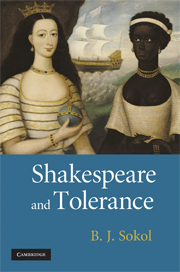Book contents
- Frontmatter
- Contents
- List of abbreviated titles
- Introduction
- 1 Shakespeare, jokes, humour, and tolerance
- 2 Shakespeare, gender, and tolerance
- 3 Shakespeare, tolerance, and nationality
- 4 Shakespeare, tolerance, and religion
- 5 ‘Race’, part one
- 6 ‘Race’, part two: Shakespeare and slavery
- 7 Afterword: tolerance as a species of love
- Notes
- Bibliography
- Index
4 - Shakespeare, tolerance, and religion
Published online by Cambridge University Press: 20 August 2009
- Frontmatter
- Contents
- List of abbreviated titles
- Introduction
- 1 Shakespeare, jokes, humour, and tolerance
- 2 Shakespeare, gender, and tolerance
- 3 Shakespeare, tolerance, and nationality
- 4 Shakespeare, tolerance, and religion
- 5 ‘Race’, part one
- 6 ‘Race’, part two: Shakespeare and slavery
- 7 Afterword: tolerance as a species of love
- Notes
- Bibliography
- Index
Summary
A REPRISE
I have just claimed that in Henry V 3.3 Captains Jamy and Gower intervene humorously in an attempt to ‘extricate from angry dissension the tolerant impetuses in a dialogue seeking mutual understanding’. I will next argue that their action and its humorous mode find an exact analogue in a very remarkable, but not wholly unprecedented, work by Shakespeare's contemporary Jean Bodin. Only there the parallel action is intended to stop dissension over religious rather than national differences.
JEAN BODIN'S DIALOGUE BETWEEN SEVEN RELIGIOUS OUTLOOKS
Although unsigned, the Colloquium of the Seven about Secrets of the Sublime was almost certainly written by Bodin (and no other), late in his life, probably between 1588 and 1593. Originally circulated in Latin and French manuscripts, it became a famous and eagerly sought ‘underground’ text, but remained unprinted until long after Shakespeare's lifetime. Bodin's Colloquium is important for our purposes because it shows that western European culture in Shakespeare's age was capable of imagining wholly open-minded intra-religious dialogue; in addition, as just mentioned, it dramatises the protection of that dialogue in a manner eerily similar to that witnessed in Henry V.
The Colloquium of the Seven consists of a series of dramatised conversations between a Roman Catholic, a Muslim, a Calvinist, a Lutheran, a Natural Philosopher, a Sceptic, and a Jew. In consequence of this wide diversity of participants, Bodin's work cannot be understood in terms of merely politique concessions to religious pluralism.
- Type
- Chapter
- Information
- Shakespeare and Tolerance , pp. 90 - 112Publisher: Cambridge University PressPrint publication year: 2008

